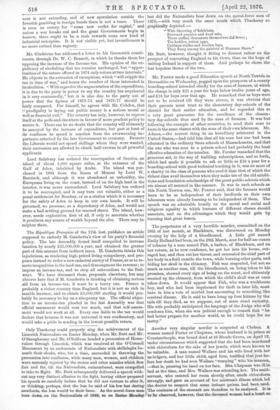Mr. Forster made a good Education speech at North Tawton
in Devonshire on Wednesday, pegged upon the prospects of a county boarding-school intended chiefly for the sons of farmers, at which the charge is only £21 a year for boys below twelve years of age, and £24 for boys over that age. He remarked that as boys were not to be received till they were eleven, it was obvious that their parents must trust to the elementary day-schools of the district for their earlier education, and he regarded this as a very great guarantee for the excellence of the elemen- tary day-schools thus used by the sons of farmers. It was but following the example of ether countries, to send their sons to learn in the same classes with the sons of their own labourers. Mr. Adams,—the nearest thing to an hereditary aristocrat in the- United States,—had told him that all his sons but one had been educated in the ordinary State schools of Massachusetts, and that the one who was sent to a private school had probably the least effective education of the number. Mr. Forster remarked that the generous aid, in the way of building subscriptions, and so forth, which had made it possible to ask so little as £24 a year for a boarding-school with good technical teaching in it, was no more of a charity to the class of persons who used it than that of which the richest class avail themselves when they make use of the old exhibi- tions and foundation scholarships of the great public schools which. are almost all assisted in like manner. It was in such schools as this North Tawton one, Mr. Forster said, that the farmers would learn to be as independent of their landlords as their own labourers were already learning to be independent of them. The speech was an admirable homily on the moral and social and religious equality in which learners of different classes should associate, and on the advantages which they would gain by learning that great lesson.






























 Previous page
Previous page